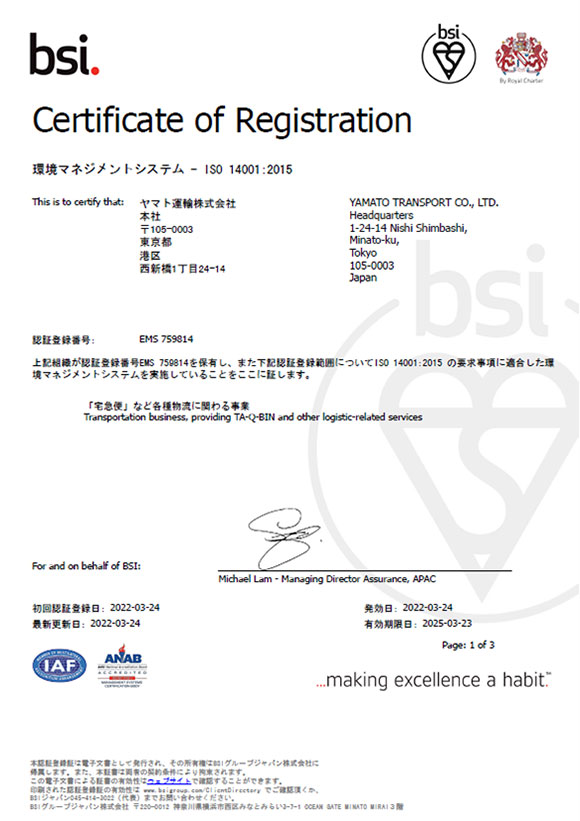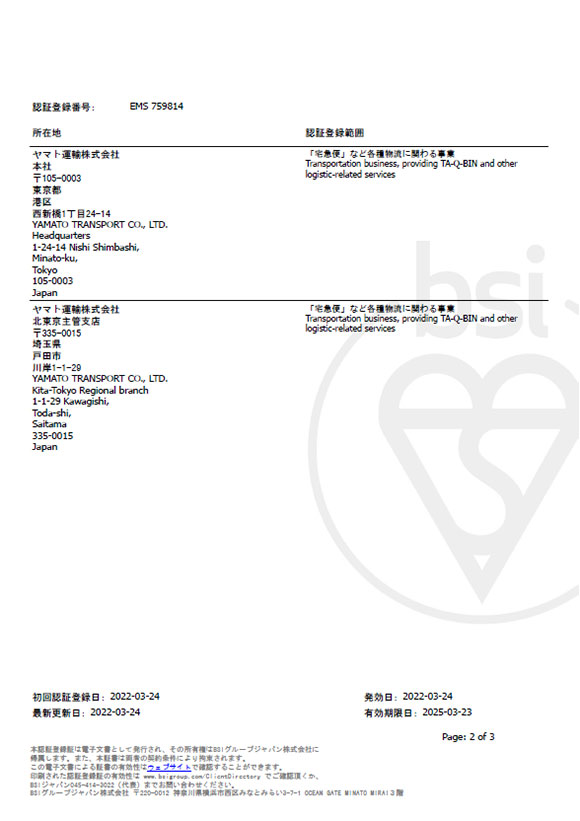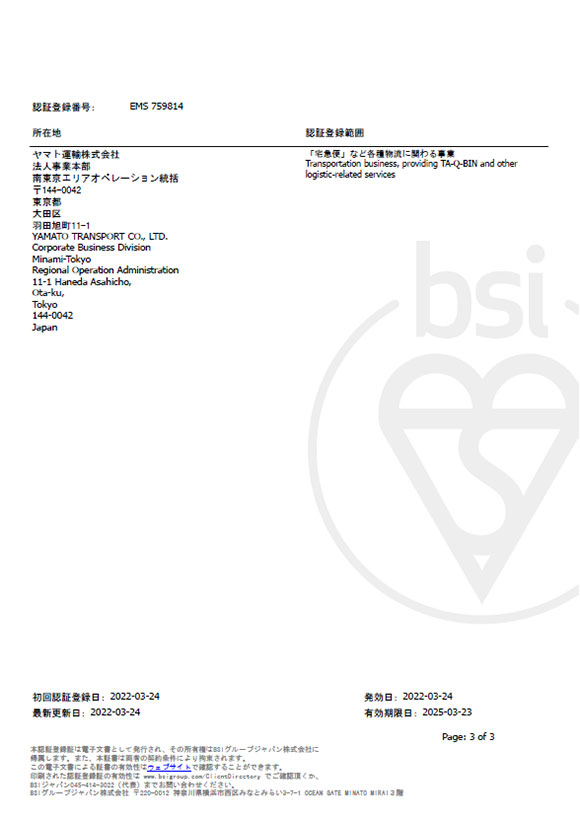Environmental Management
To achieve corporate management in harmony with the environment, the Yamato Group strives to identify and reduce the environmental impact of its business activities and create environmental value that contributes to the advancement of society.
Yamato Group Environmental Policy
The Yamato Group engages in business activities that contribute to environmental protection, in accordance with its environmental policy. Recognizing our responsibility as a key part of social infrastructure in our management philosophy, we established an environmental policy in 2021, in order to evolve further into a more sustainable part of social infrastructure. The policy is a commitment demonstrating the Group's intentions and reflecting the opinions of its various stakeholders - including employees and experts * - based on resolutions by its Board of Directors. Based on this policy, we are implementing initiatives daily to support a more enriched society in the future, as a part of sustainable social infrastructure. For details, please refer to the Yamato Group Environmental Policy.
- *Experts: Prof. Jusen Asuka, Professor, Center for Northeast Asian Studies and Graduate School of Environmental Sciences, Tohoku University; Dr. Tomohiro Tasaki, Head, Material Cycles and Social Systems Research Section, National Institute for Environmental Studies, Japan
Environmental materialities and Vision
We have identified four environmental materialities that relate deeply to the Yamato Group's business growth and the global environment: Energy & Climate, Atmosphere, Resource Conservation & Waste, and Resilience of Companies & Society. The Group will commit to solving these issues through the realization of its Environmental Vision: "Connect. Deliver the future via green logistics." (Refer to the following materials for details on the Vision and long-term goals by priority.) Based on our recognition of the particular importance of climate change risks and opportunities, we have set targets to achieve effectively zero in-house greenhouse gas (GHG) emissions by 2050, and a 48% reduction versus fiscal 2020, by 2030. In pursuit of services that not only reduce the environmental impact of our business but also contribute to the reduction of GHG emissions, we are making recommendations for deregulation and cooperating with local governments, and we are sincerely working to mitigate and adapt to climate change.
The Yamato Group has taken steps to further promote sustainable management with the launch of the Medium-Term Management Plan “Sustainability Transformation 2030 (SX 2030) ~1st Stage~” from the fiscal year ending March 31, 2025. Taking the management theme of “a value-creating company that contributes to the realization of a sustainable future,” the Group will combine economic, environmental, and social value with the aim of enhancing the sustainability of both society and the Company.
Environmental Management System
The Yamato Group has established an environmental management system under the supervision of its Board of Directors, with the Environmental Committee as the main decision-making body; this committee deliberates, makes decisions and supervises with regard to environmental issues, including climate change. The President serves as chairperson of the Environmental Committee, and reports important matters discussed by the Environmental Committee to the Board of Directors and the Management Committee, as the overall supervisor responsible for the Environmental Management System. For example, environmental policies, including climate change mitigation and adaptation, have been approved by the Environmental Committee and resolved by the Management Committee and the Board of Directors. The Management Committee and the Board of Directors also deliberate on identification of materialities and vision, long-term targets including reducing GHG emissions, and medium-term environmental plans (targets and strategies).
Executive officers in the environmental field, executive officers responsible for regions, and representative director of Group companies are responsible for ensuring the implementation, maintenance and supervision of environmental management, and also responsible for conditions to enable execution, such as by preparing necessary management resources. As a general rule, all managers and heads of front-line organizational structures are also responsible for managing environmental risks and opportunities, including climate, as environmental managers.
Performance with respect to environmental targets such as progress in reducing GHG emissions, status of response to environmental issues including climate transition risks, compliance with laws and regulations, audit results and plans for the next fiscal year are reported to committees at each level (attended by the above-mentioned management team members and executives) for monitoring, supervision, and evaluation. Specifically, these matters are reported from the Environment Committees of the front-line regional branches (four times a year) to the regional Environment Committees (four times a year), the Environmental Committee of each Group company (once a year), the Environmental Subcommittee that discusses the four environmental issues (three times a year), and the Group Environment Committee (once a year). These reports are also subject to top management reviews by the representative director, and reported to the Board of Directors for supervision. In this way, we appropriately manage environmental risks, including climate change risks, in company-wide management processes. We also constantly review the effectiveness of environmental management and strive for continual improvement by incorporating the opinions of employees and experts in the decision-making process, and holding stakeholder dialogues.
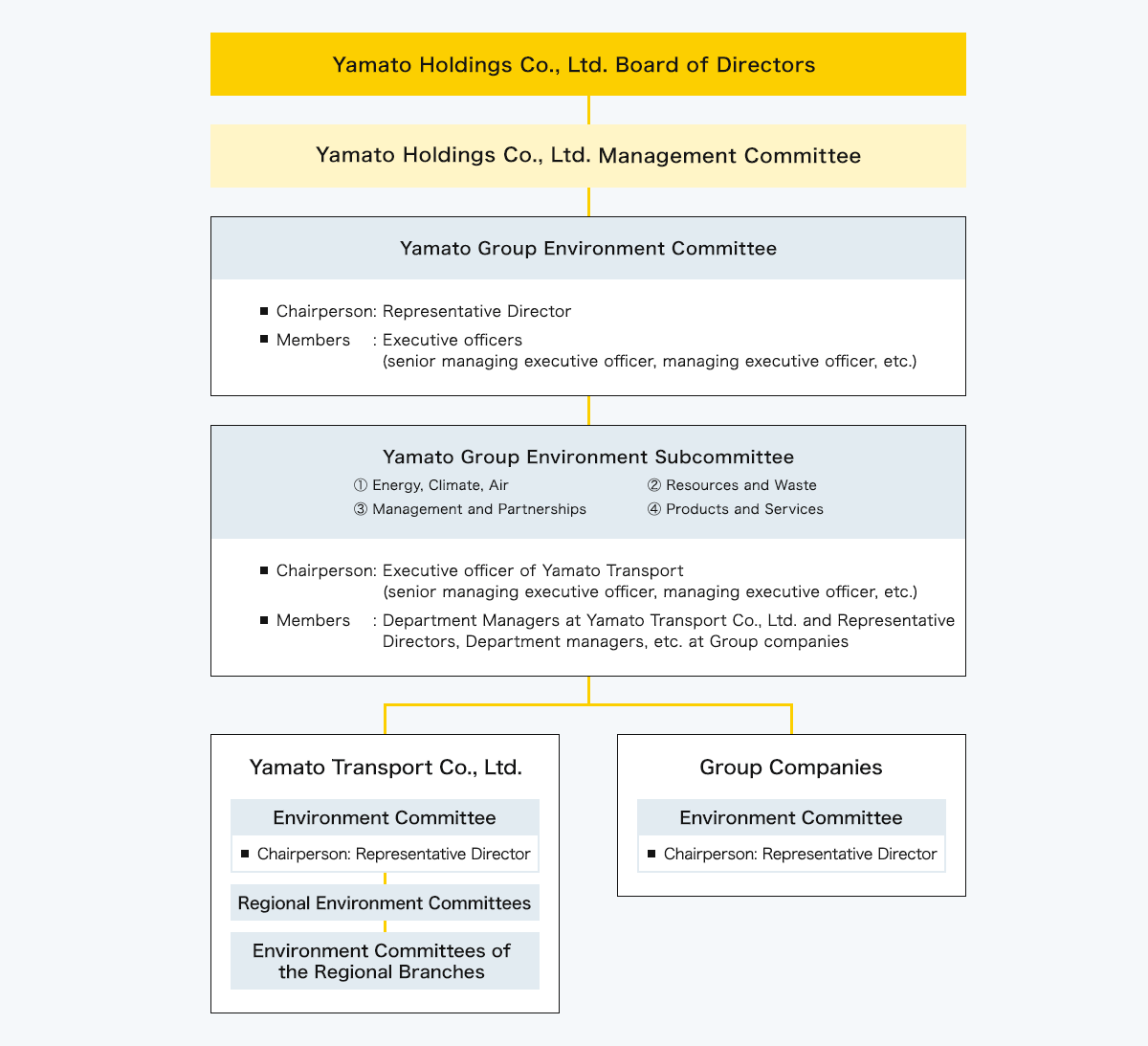
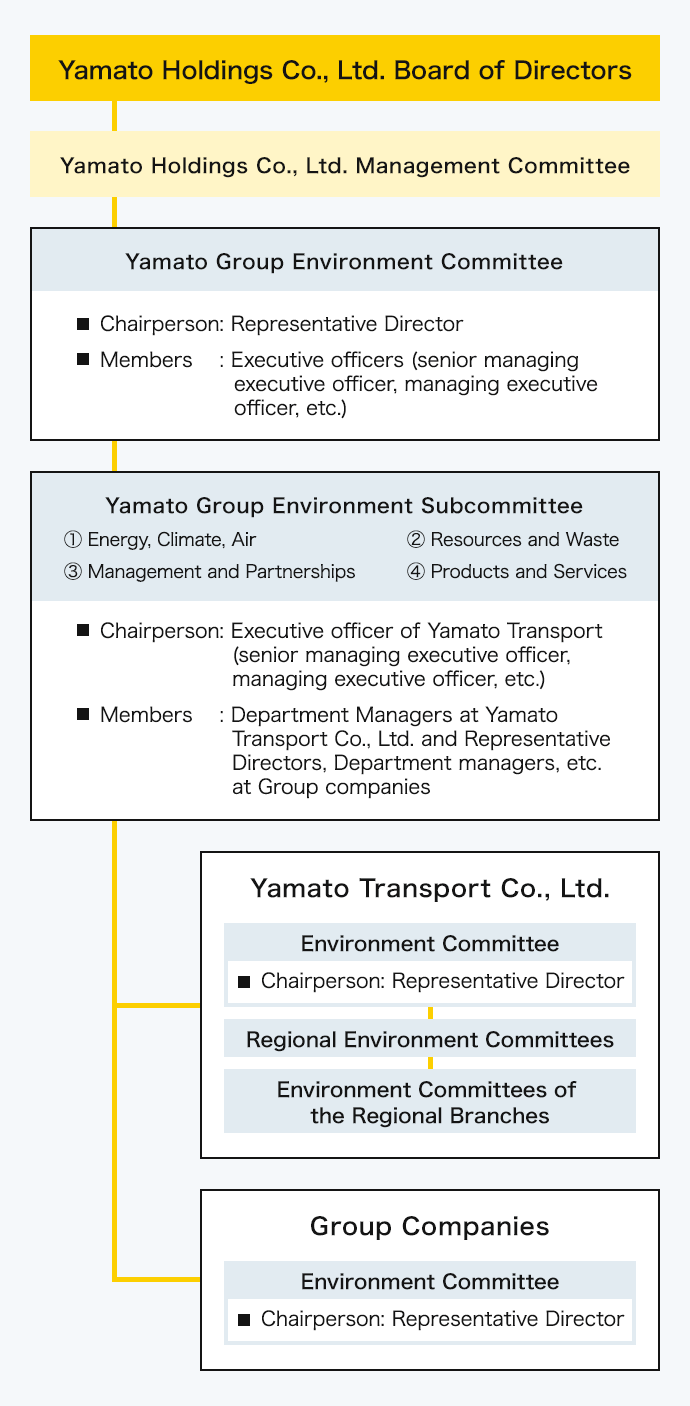
Identifying Environmental Impacts and Improving Management
The Yamato Group has introduced an environmental management system throughout the Group and at each Group company to drive environmental activities through a PDCA cycle.
Each Group company strives to identify the impact of its business activities on the environment, and is working to improve it. We also have a person responsible for environmental compliance at each business site, to identify and comply with applicable laws and regulations.
Yamato Transport has acquired ISO 14001 at some of its business sites. We identify the environmental aspects of each department's business operations, and set targets for items with a large environmental impact.
We also conduct regular internal audits (annually) to confirm these processes to take appropriate measures against issues that have been identified and prepare manuals and other measures to improve management and prevent pollution.
Additionally, we also provide education such as environmental management training, environmental compliance training, and internal auditor training, according to the roles of personnel in the environmental management system.
| Item | FY2020 | FY2021 | FY2022 | FY2023 |
|---|---|---|---|---|
| Violations of environmental laws (incidents) | 0 | 0 | 0 | 0 |
| Out of which, leakages and pollutions (incidents) | 0 | 0 | 0 | 0 |
| Fines and penalties (yen) | 0 | 0 | 0 | 0 |
- Boundary: Consolidated Group companies in Japan, and Swan Co., Ltd.
ISO14001 Certifications
| Certification | Company/site name | Acquired in |
|---|---|---|
| ISO14001:2015 (Environmental management system) |
Yamato Transport Co., Ltd. | |
| Headquarters | 2022 | |
| Kita-Tokyo Regional branch | 2022 | |
| Corporate Business Division Minami-Tokyo Regional Operation Administration | 2022 | |
- The business sites that have obtained ISO 14001 certification are 0.1% of all Yamato Transport Co., Ltd. business sites
